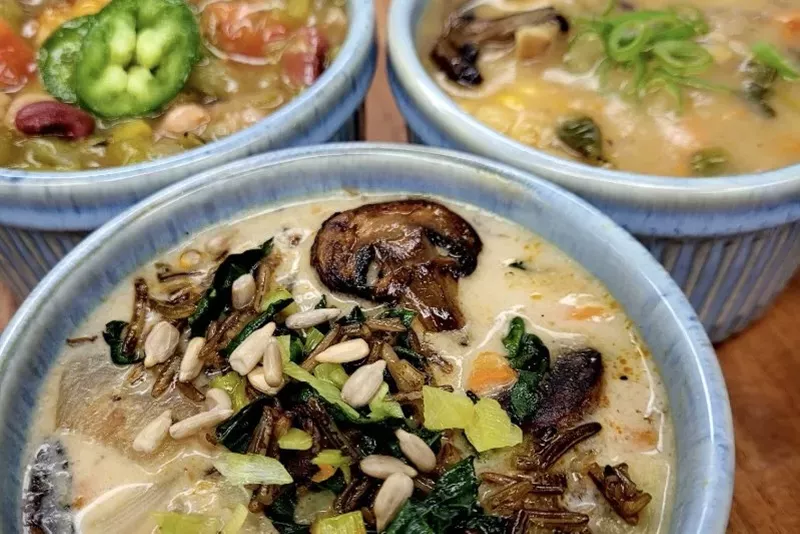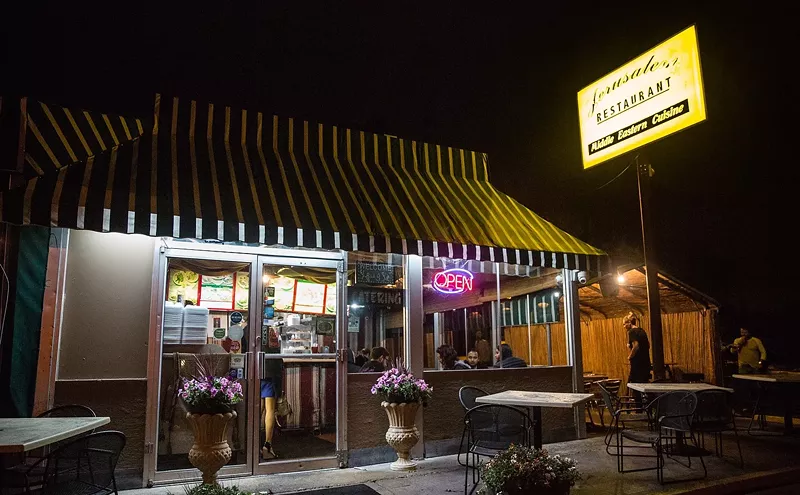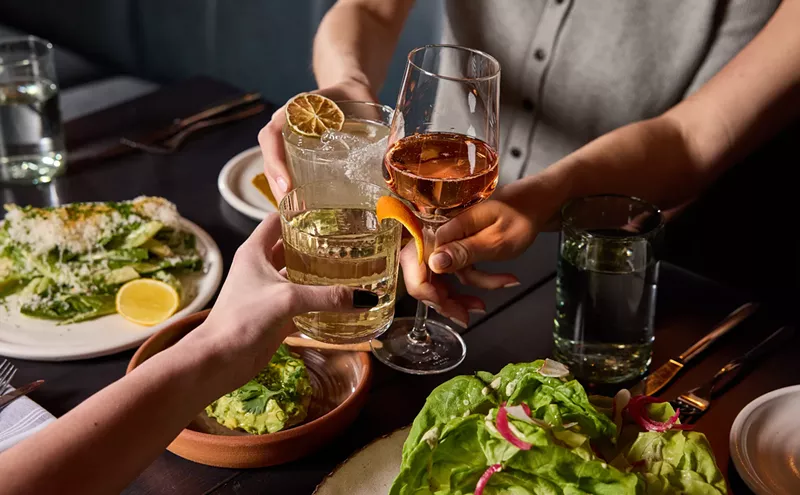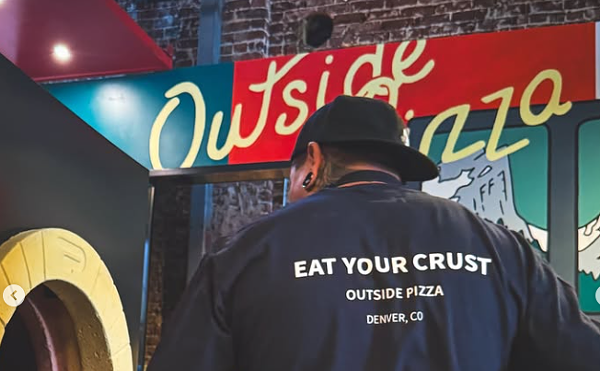Narissa Ribera plants seeds in the ground and in the minds of many, from the climate-conscious to Indigenous individuals like herself. She is Diné, a member of the Navajo Nation who was raised in Denver — although her urban being was augmented by time in Page, Arizona, where her mother’s side has reservation land.
When Ribera visited recently, her mother admitted that she felt distanced from traditional ways, more so than those family members who grew up on the rez. But the other relatives affirmed that they, too, are reclaiming pieces of their cultural patchwork. “No one person can give it all to us because of what colonization has done to my people,” says Ribera.
But elders hold fast to Diné stories and traditions. As Ribera’s grandmother made meals using traditional plants and techniques, she noticed how certain foods would take her grandmother back in time. That inspired her own journey into Indigenous cooking and food activism. “This is important for us to save. This is important for us to have access to," she says.
“My ancestors were completely food sovereign for thousands of years, and of these foods that they relied upon, maybe we have access to 5 or 10 percent,” Ribera explains. “There are whole generations of Native people being raised without ever trying or having a relationship with [these foods]. Colonization sought to sever our relationship with the land. I want to give that back.”
At her home in Denver, Ribera soon amassed a living library of Indigenous plants, which she sold as seeds and starters. That led to a cottage food business and, ultimately, her latest venture: Ch'il Indigenous Foods, a plant-based catering and take-out concept located in Wheat Ridge.
While Ribera doesn’t particularly push the brand’s vegan aspect, it has cultural significance. “We ate a lot of plants. That's what we had a lot of,” she says, adding that according to traditional Navajo teachings, meat from domesticated animals and even eggs were off the menu. Dairy is another foreign ingredient, as cattle arrived with European settlers. Instead, Diné people made pinon milk after weeks of foraging for pine nuts.
To create dishes for Ch'il Indigenous Foods, Ribera has returned to age-old practices. “We wild harvest because there are some things that just grow better in the wild — but we do that sustainably," she says. "We're not taking whole plants and ripping up their roots, and we're not taking plants that are about to [bloom]. We're thinking about the pollinators when we're doing this work. It takes more time and it takes more effort, but this isn't about money. This is about bringing back."
In addition, Ribera sources ingredients from Native-owned organic farms. These heirloom crops come at a higher cost, but she says she happily supports the work that, in turn, supports communities on several reservations.
While different tribal nations have differing beliefs about ingredients, many use similar items in their cooking. “I try to make foods with other tribes’ traditional foods, like I'll get my wild rice from an Ojibwe man. He goes out and hand-harvests it on the canoe, on the lakes. I get some corn from an Oneida man who can't use all of his corn from his harvest," she says.
“I try to also learn about those other cultures because I teach [people] from all different backgrounds. There's not often Native chefs of their culture here doing that work. Our options are limited, so I do the best that I can with it.”
Along with traditional ingredients, Ch'il Indigenous Foods incorporates American staples such as flour, which was issued as a government ration during 1860s displacements. This cruel yet resilient era brought about fry bread, as well as k'ineeshbizhii. Ribera describes these Navajo dumplings as fat noodles that are essentially boiled strips of fry bread dough. “That's not a traditional food, but I have a really deep relationship with it because my mom and my grandma would make it for us,” she explains.
Ribera is a mother of three, and she recognizes that the foods her children are familiar with were influenced by many cultures. In addition, she notes, American palates accustomed to rich ingredients like sugar and salt might find traditional Diné recipes quite plain. Ch'il Indigenous Foods looks to bridge the gap between cultures and flavors.
“Something that we do is a blue corn biscuit that's made with blue corn from the rez — that's stone ground, that's roasted. We wild harvest the juniper ash and burn it down, and then it's added with the organic wheat,” she says of one popular dish.
Those three core ingredients are also found in Chi'il's Navajo tacos. Ribera uses her grandmother’s recipe for blue corn fry bread, which is topped with customizable options like roasted corn salsa, red pepper quinoa, charred vegetables and chile amaranth beans.
Native-sourced tepary beans, neeshjizhii (a Navajo corn traditionally steamed underground) and house-grown blue Hubbard or Navajo cushaw squash form the base of Ch'il's Three Sisters soup. For millennia, Indigenous people have cultivated these crops together for many purposes, including yield but also soil health and biodiversity.
In contrast, she notes, today’s agricultural practices are often short-sighted and profit-driven. “Our food sovereignty, part of that is slipping and being taken from us through climate change. This is why Indigenous wisdom is important and should have a seat at the table, because we have survived through so many different changes and we listen to the Earth. That's what I'm doing. I'm listening to the Earth. It's telling me to do something about it," she says.
On her family’s property in Arizona, Ribera would like to introduce dryland farming, an ancient practice among Navajo and Indigenous peoples around the world. Through its various techniques, drought-resistant crops thrive without the aid of irrigated water. While she seeks U.S. Department of Agriculture funding for that project, Ribera dryland farms Indigenous plants on two commercial plots next to Happiness Gardens in Wheat Ridge. From this site, she hosts volunteer gardening events that involve activities like building raised beds and conserving Native plants, such as the Four Corners potato.
Ch'il and Ribera's side project, Nááts'íilid Kitchen, are housed at the Wheat Ridge Center for Music and Arts. There, alongside crop starters, Ch'il sells base ingredients such as green and red Hatch green chile powders, white and blue corn flours, fry bread mix and Indigenous popcorn kernels. Its seasoned popcorn varieties offer tempting with options like pink-hued prickly pear and a blend of onion, garlic and wild-harvested sage.
While some tribal members have suggested that traditional plants and practices be reserved for Indigenous people, “I'm not about gatekeeping," Ribera says. "People should be adapting to this climate and to our region. Native people, and native seeds and plants, have done that work already.”
Ch'il Indigenous Foods and Nááts'íilid Kitchen are based at 7530 West 38th Avenue; online orders can be picked up every other Friday between 5:30 and 7:30 p.m. There will be an Indigenous plant sale at 10 a.m. on Saturday, May 10. Get more information at chil-indigenousfoods.com.

Audio By Carbonatix
[
{
"name": "GPT - Billboard - Slot Inline - Content - Labeled - No Desktop",
"component": "23668565",
"insertPoint": "2",
"requiredCountToDisplay": "2"
},{
"name": "STN Player - Float - Mobile Only ",
"component": "23853568",
"insertPoint": "2",
"requiredCountToDisplay": "2"
},{
"name": "Editor Picks",
"component": "17242653",
"insertPoint": "4",
"requiredCountToDisplay": "1"
},{
"name": "Inline Links",
"component": "18838239",
"insertPoint": "8th",
"startingPoint": 8,
"requiredCountToDisplay": "7",
"maxInsertions": 25
},{
"name": "GPT - 2x Rectangles Desktop, Tower on Mobile - Labeled",
"component": "24956856",
"insertPoint": "8th",
"startingPoint": 8,
"requiredCountToDisplay": "7",
"maxInsertions": 25
},{
"name": "Inline Links",
"component": "18838239",
"insertPoint": "8th",
"startingPoint": 12,
"requiredCountToDisplay": "11",
"maxInsertions": 25
},{
"name": "GPT - Leaderboard to Tower - Slot Auto-select - Labeled",
"component": "17676724",
"insertPoint": "8th",
"startingPoint": 12,
"requiredCountToDisplay": "11",
"maxInsertions": 25
}
]












